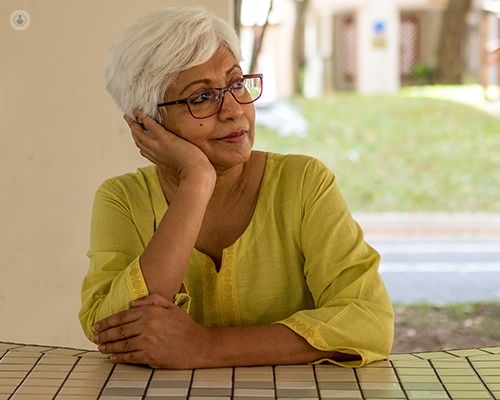COVID-19 and osteoporosis: Continuing treatment from home and managing fracture pain
Autore:Your osteoporosis treatment during COVID-19 can continue smoothly despite the closures of many hospitals and clinics. Some treatments can be delayed but others cannot.
This article clarifies how to continue your treatment – be it tablets, injections or infusions – and how to alleviate the pain of fractures, particularly spine fractures. It also stresses the significance of going to your hospital or clinic should you experience a fracture during the crisis.

Does osteoporosis increase the risk of severe COVID-19 symptoms?
No, it does not. Having osteoporosis does not increase your risk of catching COVID-19 nor does it increase the risk of experiencing severe symptoms.
Has the risk of fractures lowered since lockdown?
Fractures are slightly less likely to happen while living in lockdown. Most fractures occur during activity or from falls outside, especially on ice - only a relatively small percentage of falls happen at home.
However, it is very important to avoid situations that put you at risk of a spine fracture, particularly if you are knowingly at risk of a spine fracture or have already had one. Avoid lifting heavy objects and putting stress on the spine. If you need to do activities like turning a mattress, moving a wardrobe or lifting heavy household objects, get help. Ideally, you want to avoid fractures. However, falls are unexpected and can still happen from tripping over garden or household objects.
Is it safe to go to the hospital for a fracture?
If you think you’ve had a fracture, go to the hospital. You’ll receive an x-ray and medical care. The risk of not having the fracture diagnosed is much greater than the risk of going to the hospital. Hospitals and clinics have many measures in place to greatly reduce the risks of catching COVID-19.
Should patients continue their treatment? Can it be delayed?
As of the 13th of May 2020, the advice for osteoporosis patients is to continue as normal with treatment, unless advised otherwise by their specialist. The Royal Osteoporosis Society has a page dedicated to COVID-19 and osteoporosis and is a valuable source for frequent and up-to-date information.
Patients on tablet medication:
For patients on tablets to prevent fractures, continue with your normal prescriptions and pick them up from the pharmacy.
Patients on injection or infusion treatment:
There are four drugs people will be taking. The advice from the Royal Osteoporosis Society is as follows:
- Teriparatide – Patients administer these themselves daily. There is no reason to stop injecting the drugs, so continue as normal.
- Ibandronic acid injection – This is injected every three months by a doctor or someone at the hospital. Missing a couple of injections is fine. However, you should not miss more than three injections.
- Zoledronic acid infusion – It is okay for this annual injection to be delayed a few months. For example, if you were due your next injection in April, waiting until the summer is fine.
- Prolia (Denosumab) – This drug is prescribed to be taken every six months and it is essential to make sure you get it on time. Not getting it on time can result in quite rapidly losing bone density, which increases the likelihood of a spine fracture.
If you have not been sent a reminder by your Denosumab provider but know you are due your next injection, call them to learn how they’ll provide you with it. If the provider can’t administer your injection, ask if they can guide you on self-administering it.
I’m arranging for the Denosumab to be delivered to my patients’ homes by courier and then arranging to do a video consultation with them. In this video call, I demonstrate how to give the injection to the patient’s friend or family member (generally someone they live with) or to the patient themselves. The syringe is not designed for people to give the injection to themselves, but it is possible. It’s not very difficult and even the elderly can administer the injection.
In short, ensure you get your Denosumab injection on time from your provider or if you’re unable to visit your provider’s clinic, discover how you can get it from home.
How can patients still get treatment from home?
Patients with prescribed tablets continue to receive them as normal, no matter if they are prescribed by the NHS or a private specialist.
For those who need guidance on their treatment, I’m using video consultations. These are easy, straightforward, and particularly useful when in-person consultation would have been required, such as when giving the Denosumab injection, as explained above.
Are osteoporosis risks still being monitored?
If someone breaks a bone, in many parts of the UK they would normally automatically be assessed by a DEXA scanner to see if they have osteoporosis. These services have been suspended almost everywhere for now and, as of May 13th, we don’t know when they will restart. The waiting list will be longer due to this and the scan will likely happen later than usual.
What should I do at present if I have a fracture of the spine, hip or another bone?
- Spine: If you suffer from a spine fracture, regardless if it’s your first spine fracture or not, you should get started on treatment. Go to the GP and you will most likely be given tablet treatment.
- Hip: If you’ve had a hip fracture, you may well be started on treatment while you are in hospital without waiting for a DEXA scanner to become available.
- Other bone: If you fracture another bone like the leg or wrist, you’ll most likely receive a splint. You should ask to be put on a waiting list for a DEXA scan.
How can I manage a spine fracture and bone health during lockdown?
For the pain, basic painkillers (such as paracetamol) are worth taking, but they won’t relieve the pain, they will just take the edge off. Avoid morphine-type drugs unless absolutely essential.
You should also be doing some form of exercise that targets the spine. A physio would usually be able to help but during the COVID-19 crisis, this is difficult.
Exercises for the spine help to gradually lessen the pain, meanwhile other exercises for osteoporosis help to minimise the breakdown of bones. You should be doing general exercise, getting out and walking when you can.
Pilates for osteoporosis is designed to not put too much pressure on the spine. The NHS has a page dedicated to Pilates-inspired workouts for people with osteoporosis. If you’ve had a spine fracture, you won’t be able to do them all in the beginning, but as time goes on, you will be able to do more.


